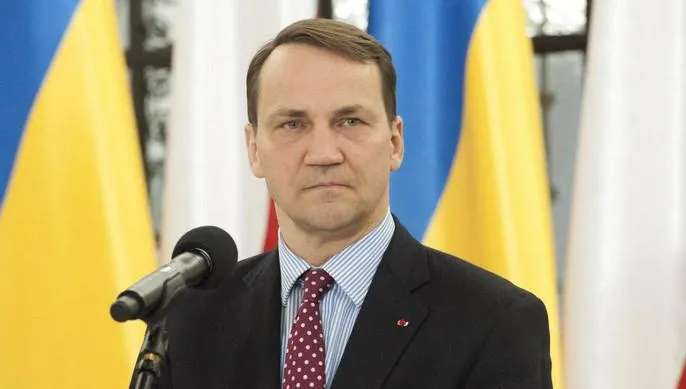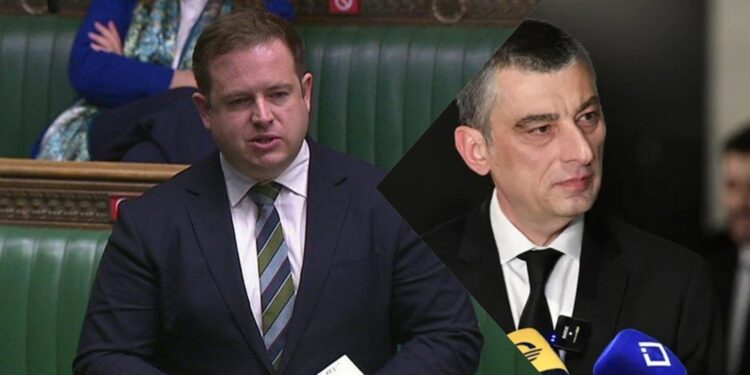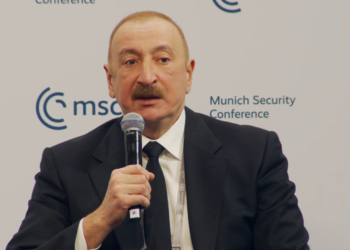The United Kingdom has expressed strong concern over what it describes as politically motivated actions by the Georgian government, including the recent sentencing of several opposition leaders and broader democratic backsliding in the country.
Stephen Doughty, the UK Minister for Europe at the Foreign, Commonwealth & Development Office (FCDO), issued a sharply worded statement condemning the Georgian authorities’ actions. “I am deeply concerned by the recent sentencing of several prominent Georgian opposition figures,” Doughty said. “These sentences appear to be politically motivated and are clearly intended to block the opposition’s participation in the upcoming elections.”
The Minister recalled that on June 23, the UK had already urged the ruling Georgian Dream party to stop abusing the judiciary to silence dissent and to release all political prisoners. He also noted that the FCDO summoned Georgia’s acting ambassador on June 30 to express the UK’s “strong opposition to Georgia’s increasingly harmful trajectory.”
Doughty said that on July 1 he chaired an emergency meeting with like-minded European democrats to discuss the situation in Georgia and potential response measures.
The UK has previously raised concerns over recent repressive legislation affecting civil society and the media, as well as restrictions on freedom of assembly and arbitrary arrests. The growing anti-Western rhetoric from Georgian Dream leaders has also been a matter of alarm for the UK government.
In his statement, Doughty recalled a recent conversation with Georgia’s 5th President Salome Zurabishvili on June 18, during which he expressed support for her efforts to protect democratic values in Georgia. Additionally, on June 26, the British ambassador in Tbilisi raised the UK’s concerns directly with Georgian Foreign Minister Ilia Darchiashvili.
“Together with our partners, we are actively exploring various options to respond to recent actions,” Doughty emphasized.
Despite the tensions, the UK reaffirmed its continued support for Georgia’s Euro-Atlantic aspirations. “The UK’s support for Georgia’s Euro-Atlantic path remains unwavering. We are ready to assist Georgia in returning to European values and democratic norms,” the statement concluded.
Yesterday’s meetings with ministers and EU representatives in Brussels, held before the EU Foreign Affairs Council meeting, was also attended by Giorgi Gakharia, Chairman of the Gakharia for Georgia party. During the meetings, Gakharia once again voiced his main message regarding the alleged suspension of visa-free regime for Georgia: “My message in Brussels is clear and unchanged: the Georgian people should not be punished for the brutal repressions of the ‘Georgian Dream’ regime,” he stated.
He emphasized the need to agree on concrete, targeted measures that will hold those truly responsible accountable.
“It is essential to reach an agreement on specific, targeted measures that will place full responsibility on those who are truly guilty,” Gakharia stated.
He further emphasized the crucial importance and urgent necessity of unified and coordinated actions by the European Union, the United Kingdom, and the United States in supporting the Georgian people.
As a result of his efforts and the meetings he held, the process of suspending visa liberalization was postponed, as the ministers agreed that the Georgian people should not be punished for the government’s anti-democratic actions.
Polish Foreign Minister Radosław Sikorski has voiced strong concerns about the political situation in Georgia following a meeting with Gakharia. Sikorski said Gakharia provided detailed information about the ongoing persecution of the opposition by the current government.
“I met with the former Prime Minister of Georgia, who informed me about the persecution of the opposition in that country,” Sikorski stated. “Poland has shifted its focus—from supporting the Georgian government’s European aspirations, which it has clearly abandoned, to standing with Georgia’s civil society.”
He added that Poland is exploring the possibility of sanctions against individuals responsible for political repression. “We support the EU High Representative Kaja Kallas’s approach to push the Georgian government to end the persecution of opposition voices,” he noted. “I spoke to a former prime minister whose charges seem entirely fabricated. Poland supports the Georgian people and their pro-European aspirations.”
 Polish Foreign Minister Radosław Sikorski
Polish Foreign Minister Radosław Sikorski
Sikorski also expressed hope that the Georgian government would return to the commitments it made during the elections, rather than continuing down a path that distances the country from Europe.
Emphasizing that the Georgian people should not be punished for the government’s actions, Sikorski said, “I was born in communist Poland. Even under an authoritarian regime, we had the chance to travel, and countries like Austria, Sweden, and West Berlin gave us visa-free access. It was a window to the world. That’s why we believe sanctions should target those responsible for repression—not the people.”














